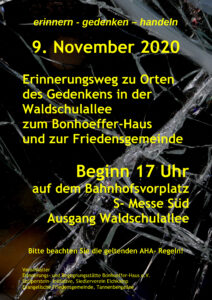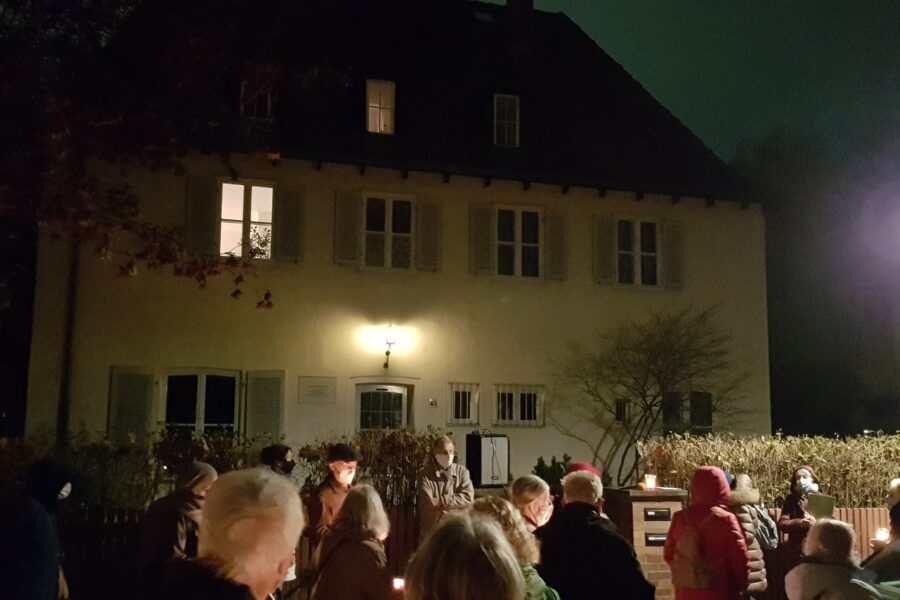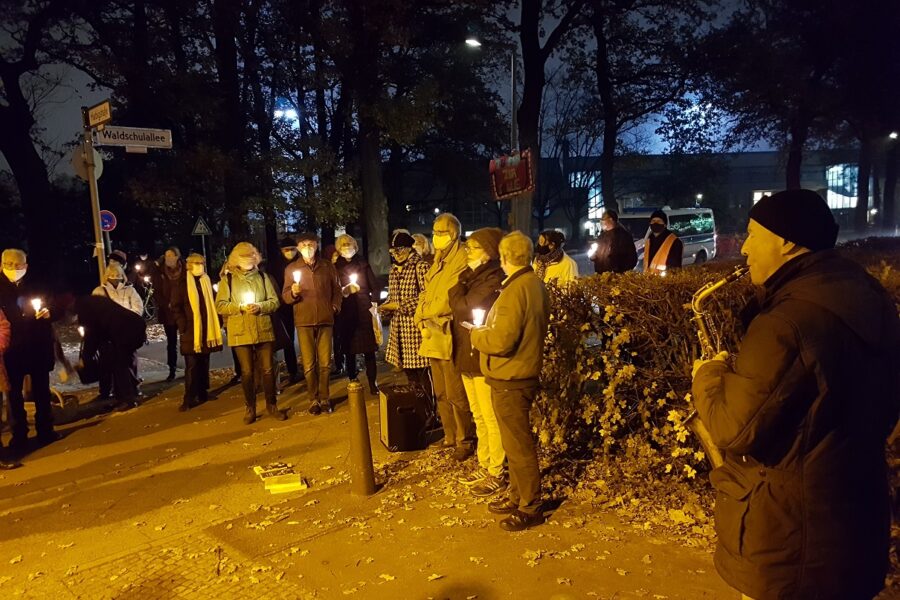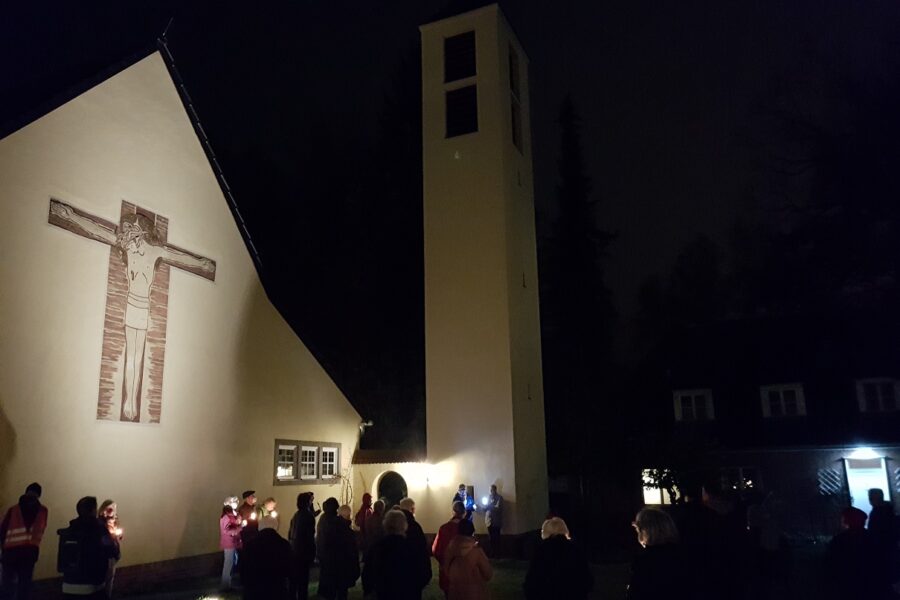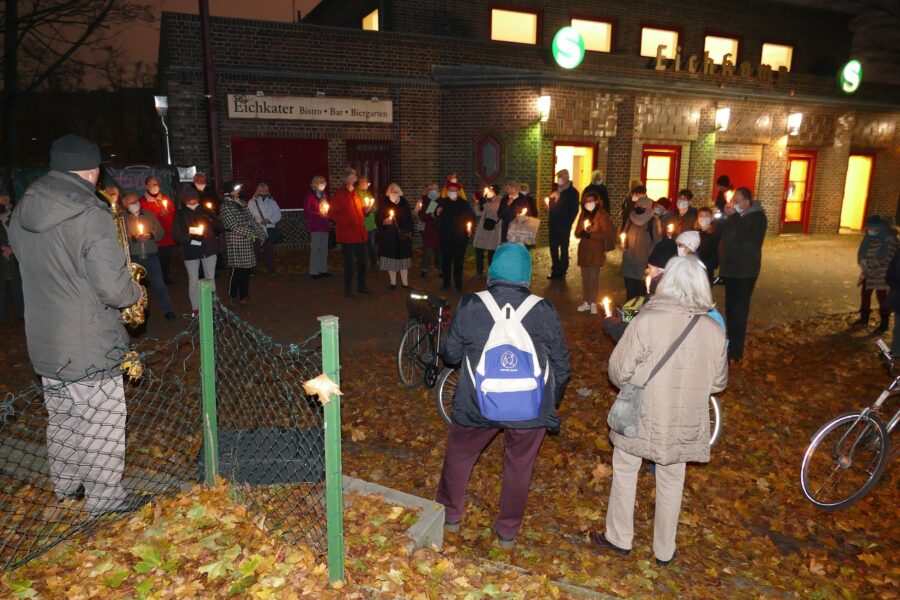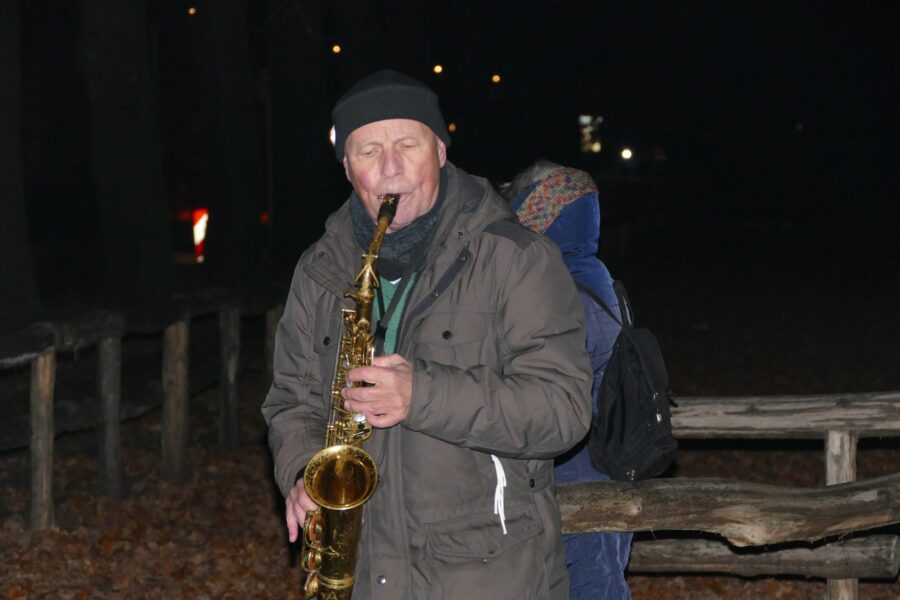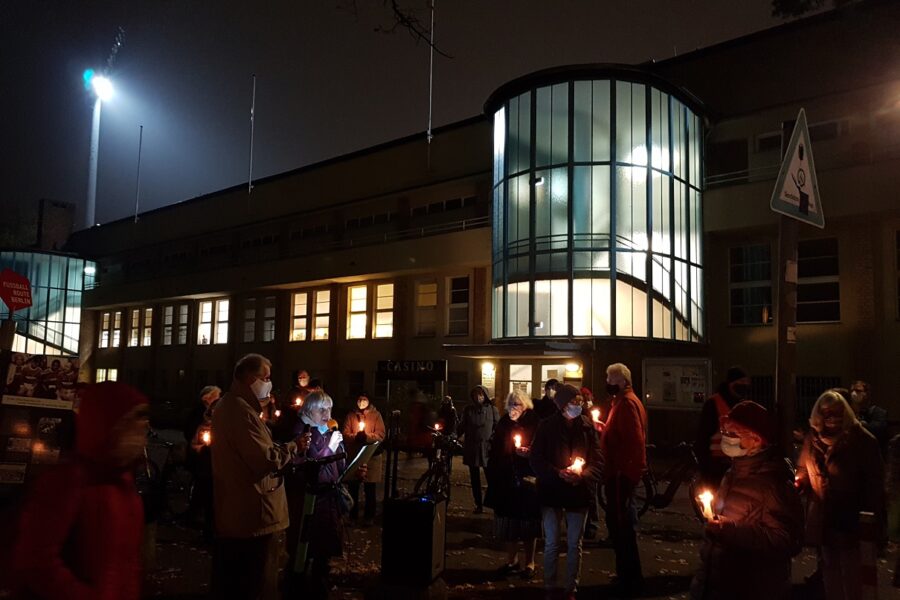Erinnerungs- und Begegnungsstätte Bonhoeffer-Haus
www.bonhoeffer-haus-berlin.de (Texte in deutscher und englischer Sprache)
Dies ist der letzte Beitrag auf der Website des Bonhoeffer-Hauses (unter: Aktuelles) in der Reihe der Blogs seit dem Sonntag Judika am 29. März 2020. Dadurch sollte das Haus, das seit Anfang Mai wieder von Kleingruppen bis zu 5 Personen besucht werden kann, digital offen gehalten werden. In den 13 Folgen (s. Überblick) wurden ganz unterschiedliche Bonhoeffer-Texte in ihren historischen und den aktuellen Kontext gestellt unter dem Aspekt:
»Wie gehören politischer Widerstand und seelische Widerstandskraft zusammen?«
In diesen Tagen, in denen Impfgegner, Anhänger von Verschwörungstheorien und andere demokratiefeindliche Aktivisten den „Widerstandsbegriff“ für sich reklamieren, ist es umso wichtiger, -völlig im Widerspruch zu diesen – Bonhoeffers Leben und Denken im Widerstand wahr-zunehmen als Hilfe zur Stärkung und Klärung in kritischen Zeiten.
Mit herzlichen Grüßen und guten Wünschen
Gottfried Brezger
TRINITATIS: Die vollkommene Liebe als das Geheimnis des lebendigen Gottes
– Die Rede vom dreieinigen Gott
TEXT
DBW 13,359-363 (kursiv original).
Predigt am Sonntag Trinitatis, London, 27. Mai 1934
- Korinther 2,7-10
Wir reden von der heimlichen, verborgenen Weisheit Gottes, welche Gott verordnet hat vor der Welt zu unserer Herrlichkeit, welche keiner von den Obersten dieser Welt erkannt hat; denn wo sie die erkannt hätten, hätten sie den Herrn der Herrlichkeit nicht gekreuzigt. Sondern wie geschrieben steht (Jesaja 64,3): „Was kein Auge gesehen hat und kein Ohr gehört hat und in keines Menschen Herz gekommen ist, was Gott bereitet hat denen, die ihn lieben.“ Uns aber hat es Gott offenbart durch seinen Geist; denn der Geist erforscht alle Dinge, auch die Tiefen der Gottheit.
Die Geheimnislosigkeit unseres modernen Lebens ist unser Verfall und unsere Armut. Ein menschliches Leben ist so viel wert, als es Respekt behält vor dem Geheimnis. Ein Mensch erhält sich so viel vom Kinde ihn ihm, als er das Geheimnis ehrt. Darum haben die Kinder so offene, erwachende Augen, weil sie wissen, dass sie umgeben sind vom Geheimnis …
Dass das Geheimnis die Wurzel alles Begreiflichen und Klaren und Offenbaren ist, das wollen wir nicht hören … Das Geheimnis bleibt Geheimnis. Es entzieht sich unserem Zugriff. Geheim-nis heißt nun aber nicht einfach, etwas nicht wissen … Nicht der fernste Mensch ist uns das größte Geheimnis, sondern grade der Nächste. Und sein Geheimnis wird uns dadurch nicht geringer, dass wir immer mehr von ihm wissen; sondern in seiner Nähe wird er uns immer ge-heimnisvoller. Es ist die letzte Tiefe alles Geheimnisvollen, wenn zwei Menschen einander so nahe kommen, dass sie einander lieben. …
Warum sagen wir das alles heute, am Tag, an dem wir [von] der Dreieinigkeit Gottes reden sollen? Wir sagen es, um auf ganz menschliche Weise aufmerksam zu machen auf jenen Be-griff, der uns immer wieder verloren gehen will und ohne den es einfach keinen Zutritt gibt zum Verständnis des Gedankens der Dreieinigkeit Gottes – nämlich den Begriff des Geheimnisses … Gott lässt sich nicht einfach fassen, wo wir ihn grade fassen wollen, sondern die Kirche re-det von der heimlichen, verborgenen Weisheit Gottes. Gott lebt im Geheimnis. Sein Sein ist uns Geheimnis, Geheimnis von Ewigkeit her und zu Ewigkeit hin … Jedes Dogma der Kirche ist nur Hinweis auf das Geheimnis Gottes.
Aber die Welt ist gegen dieses Geheimnis blind. Sie will einen Gott, den sie verrechnen und ausnutzen kann oder sie will gar keinen Gott. Das Geheimnis Gottes bleibt ihr verborgen. Sie will es nicht. Sie macht sich Götter nach ihrem Wunsch, aber den nahen, heimlichen, verbor-genen Gott erkennt sie nicht ….
Die Obersten dieser Welt leben vom Rechnen und vom Nutzen, dadurch werden sie groß in der Welt – aber das Geheimnis begreifen sie nicht; das begreifen ja nur die Kinder. Ein untrüg-liches Zeichen trägt die Welt, das von ihrer Blindheit gegen das Geheimnis Gottes zeugt: das Kreuz Christi … Das also ist das unerkannte Geheimnis Gottes in dieser Welt, Jesus Christus … Geheimnis darum, weil Gott hier arm, niedrig, schwach wurde aus Liebe zu den Menschen, weil Gott ein Mensch wurde wie wir, damit wir göttlich würden, weil er zu uns kam, damit wir zu ihm kämen … Gottes Liebe und Nähe – das ist das Geheimnis Gottes, das er denen bereitet hat, die ihn lieben.
Dass es der eine Gott ist, der Vater und Schöpfer der Welt, der in Jesus Christus uns geliebt hat bis zum Tod, der im Heiligen Geist unser Herz zu ihm auftut, dass wir ihn lieben, dass es nicht drei Götter sind, sondern dass es einer ist, der die Welt vom Anfang bis zum Ende um-fängt, schafft und erlöst, und dass er doch jedes mal ganz Gott ist als der Schöpfer und Vater, als Jesus Christus und als der Heilige Geist – das ist die Tiefe der Gottheit, die wir als Geheim-nis anbeten und als Geheimnis begreifen … Gottes Selbstverherrlichung in der Liebe – das ist sein Geheimnis.
Wenn wir am Anfang des Gottesdiensts sagen: Im Namen … so rufen [wir] dies Geheimnis der Liebe Gottes an.
Wenn die Kirche seit Jahrhunderten von dem dreieinigen Gott lehrt, so ist dies alles andere als rationalistische Verhärtung der Religion, sondern es ist nichts anderes als ein dauerndes Hin-weisen wollen, durch allerlei Weise, auf das Geheimnis des lebendigen Gottes. Der Sinn der Dreieinigkeitslehre ist ungeheuer einfach, sodass ihn jedes Kind verstehen kann: es ist wahr-haftig nur ein Gott, aber dieser Gott ist die vollkommene Liebe [in der er sich selbst verherrlicht und die ganze Welt umfasst] und als solche ist er Jesus Christus und der Heilige [Geist].
KONTEXT
1 Widerstandskraft
„Ich glaube, dass Gott uns in jeder Notlage soviel Widerstandskraft geben will, wie wir brau-chen. Aber er gibt sie nicht im voraus, damit wir uns nicht auf uns selbst, sondern allein auf ihn verlassen.“
Am Anfang der Reihe mit Bonhoeffer-Texten standen diese an die Mitverschworenen gerichte-ten Worte an der Jahreswende 1942/43 (Einige Glaubenssätze über das Walten Gottes in der Geschichte“, in: Nach zehn Jahren, DBW 8,30 ff.).
Am Schluss der 13 Beiträge der 10 Wochen seit dem Sonntag Judika am 29. März 2020 lesen wir noch einmal, wie am Sonntag Exaudi, Auszüge aus einer Predigt Dietrich Bonhoeffers, nun aus seiner Londoner Zeit. Sie spricht von der „heimlichen, verborgenen Weisheit Gottes“.
Die Wichtigkeit der Predigt wurde besonders betont von Ernst Feil (Die Theologie Dietrich Bonhoeffers. Hermeneutik. Christologie. Weltverständnis, München 1971) und Hans-Jürgen Abromeit (Das Geheimnis Christi. Dietrich Bonhoeffers erfahrungsbezogene Christologie, Neukirchen-Vluyn 1991).
2 Gott lebt im Geheimnis
Bei der Bekämpfung der Pandemie werden Mittel und Wege gesucht, die Verbreitung des Vi-rus in den Griff zu bekommen und es werden keine Kosten gescheut, die Folgen zu begrenzen. Was grundsätzlich gilt, trifft hier besonders zu: Auch die Wissenschaft kann politisch Verant-wortliche nicht davon befreien, unter dem Vorbehalt der Unsicherheit zu entscheiden.
In ganz grundsätzlicher Weise hat es der christliche Glaube mit dem Vorbehalt der Ungewiss-heit zu tun. „Gott lässt sich nicht einfach fassen, wo wir ihn grade fassen wollen … Gott lebt im Geheimnis … Aber die Welt ist gegen dieses Geheimnis blind.“ Bereits im letzten Kapitel von ‚Akt und Sein‘ (1931) hat Bonhoeffer die „eschatologische Möglichkeit des Kindes“ (‚actus di-rectus‘, DBW 2,158 ff.) dem durch die Vergangenheit bestimmten Glauben des Erwachsenen in der Begrenzung seines Gewissens und Bewusstseins (‚actus reflexus‘) entgegen gesetzt.
3 Das Kreuz Christi als Zeichen für das unerkannte Geheimnis Gottes in der Welt
„Aus Liebe zu den Menschen“ wird Gott „arm, niedrig, schwach“. „Gottes Selbstverherrlichung in der Liebe – das ist sein Geheimnis.“ Als „vollkommene Liebe“ ist der eine Gott zugleich Je-sus Christ und der Heilige Geist.“ Die dreifältige Beziehung ist Zeichen der Vollkommenheit.
Ergriffen vom Unbegreiflichen, inspiriert von Gottes Liebe wird das Mitleiden am Leiden Gottes an der Welt zum Leitmotiv christlichen Handelns. Solidarität mit den besonders Bedrohten ge-hört in der Corona-Krise dazu. Aber nicht nur mit den Nächsten, sondern auch mit den Fernen. Und nicht nur mit den heute Lebenden, sondern auch mit zukünftigen Generationen. Gottes Selbstverherrlichung fordert, zu widerstehen gegen die Selbstverherrlichung von Egomanen und Autokraten, die sich in der Krise nur noch schneller um sich selber drehen.
4 „Soviel Widerstandskraft“ – Widerstand und Ergebung
Enttäuscht über die seiner Meinung nach durch „übergroße Bedenklichkeit“ verpasste Gele-genheit zu seiner Freilassung nach dem Abschluss der Untersuchungen schreibt Dietrich Bon-hoeffer am 21. Februar 1944 an seinen Freund Eberhard Bethge: über „eine negative Kehrseite der bürgerlichen Existenz, d.h. eben jenes Stück Glaubenslosigkeit, das in gesicherten Zeiten verborgen bleibt, aber in ungesicherten zum Vorschein kommt, und zwar in der Gestalt der ‚Angst‘ … vor dem selbstverständlichen, schlichten Tun und von dem Aufsichnehmen notwen-diger Entscheidungen. Ich habe mir hier [in der Haft] oft Gedanken darüber gemacht, wo die Grenzen zwischen dem notwendigen Widerstand gegen das ‚Schicksal‘ und der ebenso not-wendigen Ergebung liegen … Ich glaube, wir müssen das Große und Eigene wirklich unter-nehmen und doch zugleich das selbstverständlich- und allgemein-Notwendige tun, wir müssen dem ‚Schicksal‘ – ich finde das ‚Neutrum‘ dieses Begriffes wichtig – ebenso entschlossen ent-gegentreten wie uns ihm zu gegebener Zeit unterwerfen. Von ‚Führung‘ kann man erst jenseits dieses zwiefachen Vorgangs sprechen, Gott begegnet uns nicht nur als Du, sondern auch ‚vermummt‘ im ‚Es, und in meiner Frage geht es also im Grunde darum, wie wir in diesem ‚Es‘ (‚Schicksal‘) das ‚Du‘ finden, oder m.a.W. – verzeih, ich verabscheue Fettflecke als etwas be-sonders Unappetitliches; aber ich kann den Bogen nicht nochmal schreiben, da der Brief sonst noch länger liegen bleibt! – wie aus dem ‚Schicksal‘ wirklich ‚Führung‘ wird.
Die Grenzen zwischen Widerstand und Ergebung sind also prinzipiell nicht zu bestimmen; aber es muss beides da sein und beides mit Entschlossenheit ergriffen werden. Der Glaube fordert dieses bewegliche, lebendige Handeln.“ (DBW 8,333)
Diese Gedanken haben Eberhard Bethge 1951 dazu veranlasst, Dietrich Bonhoeffers Briefen und Aufzeichnungen aus der Haft den Titel „Widerstand und Ergebung“ zu geben.
Soviel Widerstandskraft – so viel Widerstandskraft!
Dietrich Bonhoeffer fragt nicht nach dem fernen, sondern nach dem nahen Gott. In seiner Be-drängnis durch die fortdauernde Haft geht es ihm im Blick auf seine Gottesbeziehung nicht um die ‚Warum-Frage‘. Es ist die ‚Wer-Frage‘, die aus dem ‚Es‘ ein ‚Du‘ macht – Fettfleck hin oder her.
So viel Widerstandskraft heute! Das verstehe ich in unserer Zeit der Begrenzungen aufgrund der Pandemie so: nicht in der Verfolgung von eigenen oder fremden Prinzipien und Interessen, sondern im beweglichen, lebendigen Handeln im Glauben, sowohl im Widerstand gegen Un-recht, das in dieser Krise deutlich zutage tritt, als auch in der Ergebung in oder auch Anpassung an das Selbstverständliche und Notwendige – in beidem erfahren wir Gottes ‚Führung‘ und Nä-he. Und so selbstverständlich z.B. das Abstandsgebot sein sollte, so notwendig ist es, dass wir die Widerstände überwinden, die uns hindern, denen nahe sein, die unser „Beten und Tun des Gerechten“ gerade jetzt und in der Zukunft brauchen.
Bleiben Sie behütet und getrost im beweglichen, lebendigen Handeln im Glauben!
Gottfried Brezger
Memorial and Place of Encounter Bonhoeffer-Haus Berlin
www.bonhoeffer-haus-berlin.de
So much strength to resist! Read Bonhoeffer in critical time (13)
Trinity, June 6, 2020
This is the last episode on the website of the Bonhoeffer House (see: Aktuelles / News) in the se-ries of blogs since Sunday JUDICA on March 29, 2020. This should enable the House, which has been visited by small groups of up to 5 people again since the beginning of May, to be kept digital-ly open. In the 13 episodes, very different Bonhoeffer texts were placed in their historical and cur-rent context under the aspect:
»How do political resistance and mental strength to resist (resilience) belong together?«
In these days, when opponents of vaccination, supporters of conspiracy theories and other anti-democratic activists claim the term “resistance” for themselves, it is all the more important – in complete contradiction to this – to perceive Bonhoeffer’s life and thinking in resistance as help for strengthening and clarifying.
With warm regards and good wishes
Gottfried Brezger, chairman
TRINITY: The perfect love as mystery of the living God
– The doctrine of the trinity
TEXT
DBW volume 13, p. 360-363 (the italics are original)
Sermon on 1 Corinthians 2:7-10
London, Trinity Sunday, May 27, 1934
But we speak God’s wisdom, secret and hidden, which God decreed before the ages for our glo-ry. None of the rulers of this age understood this; for if they had, they would not have crucified the Lord of glory. But, as it is written [Isa.64:4],
“What no eye has seen, nor ear heard, nor the human heart conceived, what God has prepared for those who love him – these things God has revealed to us through the Spirit; for the Spirit searches everything, even the depths of God..”
The lack of mystery in our modern life means decay and impoverishment for us. A human life is of worth to the extent that it keeps its respect for mystery. By honoring mystery, we keep within us some of the child we used to be. Children keep their eyes wide open, wide awake, because they know that they are surrounded by mystery …
That the roots of all that is clear and obvious and understandable lie in mystery, that is what we do not want to hear … The mystery remains a mystery. It eludes our grasp.
However, mystery does not mean simply not knowing something … The person farthest away from us is not the most mysterious to us, but rather the neighbor. And the mystery of that person will not be diminished for us the more we find out about him or her; instead, he or she will become ever more mysterious to us, the closer we come together. The very deepest mystery is when two persons grow so close to each other that they love each other …
Why are we saying all this today, on the day when we are supposed to be talking about God in the Holy Trinity? We say it to draw attention, in a very human way, to that concept that we are always losing sight of and without which there is simply no way to come near to understand the idea of God the Holy Trinity – that is, the concept of mystery …
God cannot simply be grasped in the way we might expect to do it; instead, the church speaks of the secret and hidden wisdom of God. God lives in mystery. To us, God’s very being is mystery, from everlasting to everlasting … Every dogma of the church only points to the mystery of God.
But the world is blind for this mystery. It wants to have either a God whom it can calculate and exploit or else no God at all. The mystery of God remains hidden from the world. The world does not want it. Instead, it makes its own gods according to its wishes and never recognizes the mys-terious and hidden God who is near at hand … The rulers of this world live by calculation and ex-ploitation; that is how they come to be great rulers in the eyes of the world. But they do not under-stand mystery; only children do.
The world carries an unmistakable sign that proves it is blind to the mystery of God: the cross of Jesus Christ … That is the unrecognized mystery of God in this world: Jesus Christ. That this Je-sus of Nazareth, the carpenter, was the Lord of glory in person, that was the mystery of God. A mystery, because here on earth God became poor and lowly, small and weak, out of love for hu-mankind; because God became a human being like us, so that we might become divine; because god came to us so that we might come to God …God’s love and closeness – that is the mystery of God, the holy mystery prepared for those who love God.
That this is the one God, Father and Creator of the world, who in Jesus Christ loved us even unto death, who in the Holy Spirit opens our hearts to receive and to love that one God; that there are not three gods, but only one, who envelops, creates, and redeems the world from beginning to end; and that in each of these God is fully God, as Creator and Father, as Jesus Christ and as the Holy Spirit – that is the depth of deity, which we worship as a mystery and understand as a mys-tery … God’s self-glorification expressed in love – that is God’s essential mystery …
When we say, at the beginning of our worship service, “In the name of God, the Father, the Son, and the Holy Spirit,” we are appealing to this mystery of the love of god. For hundreds of years the church has been teaching about God the Holy Trinity. But this is anything but a rationalistic hard-ening of religion; to the contrary, it is our continuing effort to point in every way can toward the mystery of the living God.
What the doctrine of Trinity means is immensely simple, so that any child can understand it. There is truly one God, but this God is perfect love [in which God glorifies himself and embraces the whole world in love] and as such God is Jesus Christ and the Holy [Spirit].
CONTEXT
1 Strength to resist
„I believe that in every moment of distress God will give us as much strength to resist as we need. But it is not given to us in advance, lest we rely of ourselves and not on God alone.”
At the beginning of the series with Bonhoeffer texts were these words addressed to the conspira-tors at the turn of 1942/43 (Trust, in Prologue of Letter and Papers from Prison, DBW volume 8).
At the end of the 13 episodes of the 10 weeks since Sunday Judica on March 29, 2020, we read again, as on Sunday Exaudi, extracts from a sermon by Dietrich Bonhoeffer, now from his time in London. His sermon speaks of the „secret, hidden wisdom of God“.
The importance of the sermon was particularly emphasized by Ernst Feil (Die Theologie Dietrich Bonhoef-fers. Hermeneutik. Christologie. Weltverständnis, München 1971) and Hans-Jürgen Abromeit (Das Geheim-nis Christi. Dietrich Bonhoeffers erfahrungsbezogene Christologie, Neukirchen-Vluyn 1991).
2 God lives in mystery
The fight against the pandemic looks for ways to control the spread of the virus and spares no expense in limiting the consequences. What applies in principle is particularly true here: even sci-ence cannot exempt politically responsible persons from making decisions subject to uncertainty.
Fundamentally, the Christian faith has to do with the reservation of uncertainty. “God cannot simp-ly be grasped in the way we might expect to do it … God lives in mystery … But the world is blind for this mystery.”
Already in the last chapter of ‚Act and Being‘ (1931) Bonhoeffer had the „eschatological possibility of the child“ (‚actus directus‘, DBW 2,158 ff.) opposed the adult’s belief in the limitation of his con-science and consciousness determined by the past (‚Actus reflexus‘).
3 The cross of Jesus Christ as sign for the unrecognized mystery of God in this world
“Out of love for humankind” “God became poor and lowly, small and weak.” “God’s self-glorification expressed in love – that is God’s essential mystery.” As “perfect love” is the “truly one God … Jesus Christ and the Holy Spirit.” The triune relationship is the essence of God’s perfec-tion in love.
Seized by the incomprehensible, inspired by God’s love, compassion for God’s suffering in the world becomes the basic requirement for the action of Christians. Solidarity with the particularly threatened is part of the Corona crisis. But not only with the next ones, but also with the distant ones. And not only with those living today, but also with future generations. God’s self-glorification demands to resist the self-glorification of egomaniacs and autocrats, who only revolve more quickly in the crisis.
4 As much strength to resist – resistance and submission
Disappointed at the opportunity he had missed – in his opinion – due to „excessive concern“ for his release after the investigation was completed, Dietrich Bonhoeffer wrote to his friend Eberhard Bethge on February 21, 1944, about “a negative side of bourgeois existence – simply that part of our lack of faith that remains hidden in times of security, but comes out in times of insecurity in the form of fear … of straightforward, simple actions, fear of having to make necessary decisions. I’ve often wondered here [in prison] where we are to draw the line between necessary resistance [Widerstand] to ‘fate’ and equally necessary submission [Ergebung] … I think we must rise to the great demands that come to each of us, but also do the commonplace and necessary things. We must stand up to ‘fate’ – to me the ‘neuter’ gender of this word is significant – as resolutely as we must submit to it at a given time. Only on the other side of this twofold process can we speak of ‘being led’ [‘Führung’]. God meets us not only as ‘Thou’ but also in the ‘disguise’ of an ‘It’, so my question is basically how to find the ‘Thou’ in this ‘It’. (i.e., ‚fate‘). Or in other words -excuse me, I really find grease spots disgusting, but I can’t write this page over again, since then the letter will be delayed even longer!”- how ‘fate’ really becomes ‘the state of being led’. So the boundaries between resistance and submission can’t be determined as a matter of principle but both must be there and both must be seized resolutely. Faith demands this flexible and alive way of acting.” (DBW volume 8,303 f.)
These thoughts inspired Eberhard Bethge to give Dietrich Bonhoeffer’s letters and papers from prison the title „Widerstand und Ergebung“ in 1951.
As much strength to resist – so much strength to resist!
Dietrich Bonhoeffer does not ask about the distant, but about the close God. In his distress due to the continued detention, he is not concerned with the question of “Why?” in his relationship with God. It is the question of “Who?” that turns the ‚It‘ into a ‚Thou‘ – grease or not.
So much strength to resist today! I understand this in our time of limitations due to the pandemic: not in the pursuit of own or foreign principles and interests, but in flexible, lively acting in faith, both in the resistance to injustice, which is clearly evident in this crisis, as well as in surrendering or adapting to what is self-evident and necessary – in both we experience God’s ‚guidance‘ and closeness. And so naturally e.g. the imperative of distance should be, so it is necessary for us to overcome the resistances that prevent us, to be close to those who need our “praying and doing justice” right now and in the future.
Stay protected and confident in flexible, lively acting in faith!
Blessings
Gottfried Brezger

